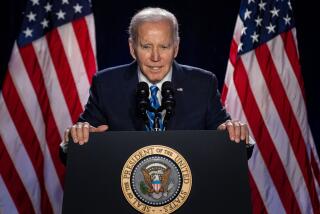White House Looks to Move Bush Agenda
- Share via
WASHINGTON — Sometime before he quit tracking the election results -- he took his final call from political advisor Karl Rove at roughly 2 a.m. EST -- President Bush told his aides, “I’ll be sleeping in.”
Indeed, he was uncharacteristically tardy in reaching the Oval Office on Wednesday. He didn’t get to work until shortly after 7 a.m. -- about 10 minutes later than usual.
But when he showed up, said a senior aide, “There was a spring in his step.”
For good reason. Bush campaigned long and hard for the GOP cause this fall, and the outcome could hardly have been more pleasing.
Rather than suffering losses common to the president’s party during midterm elections, the Republicans recaptured the Senate and widened their slim margin of control in the House.
In response, Bush’s mission Wednesday -- and that of his aides -- was to avoid any public display that could look like gloating.
Bush spent much of the day on the telephone, congratulating winners, consoling losers and meeting with aides about the legislative agenda -- for the lame-duck session of Congress that begins next week and the 108th Congress that convenes in January, aides said.
He had no meetings, other than with staff members, and kept well out of the public eye.
White House spokesman Ari Fleischer made an effort to present the administration as reaching out to Democrats.
As he listed calls that Bush made to candidates, the first name he mentioned was Mark Pryor, the Arkansas Democrat who unseated Republican Sen. Tim Hutchinson, for whom Bush had campaigned on Monday.
The White House staff was in a festive mood -- as one senior aide described it, “a cross between euphoric and unbelieving.” There was a steady stream of hugs exchanged as staffers encountered each other in their quiet, compact West Wing quarters.
When Rove arrived at 7:30 a.m. at the daily meeting of the White House senior staff in the Roosevelt Room, near the president’s office, his colleagues greeted him with prolonged applause, said one participant.
Then, this aide said, they quickly got to work, paying little heed to ubiquitous television reports that throughout the day detailed the voting results.
The immediate problem for the White House -- if it can be called a problem -- was how to portray the results. Fleischer, mindful of the decision not to appear overjoyed, declined to claim a mandate for the president.
Still, the suggestion of a voters’ mandate crept into the White House reviews of the results.
“The president is going to continue to press for his agenda. He thinks it is worthy and deserving of bipartisan support. And I think that was the message we heard last night from the country,” Fleischer said.
One veteran of senior White House jobs in previous GOP administrations said that after speaking with White House aides, “The mood from the president on down is ‘let’s roll up our sleeves and figure out how we’ll work in a bipartisan fashion.’ ”
This source, who did not want to be named, added: “But there is a deep sense of accomplishment, and a smile on everybody’s faces.”
More to Read
Get the L.A. Times Politics newsletter
Deeply reported insights into legislation, politics and policy from Sacramento, Washington and beyond. In your inbox twice per week.
You may occasionally receive promotional content from the Los Angeles Times.










